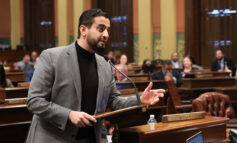
Canadian General John de Chastelain was the invited speaker at a public meeting held at the National Library in Ottawa, under the auspices of Potlucks for Peace. Potlucks for Peace is an Ottawa group of Arabs and Jews striving to understand each other’s experiences and hopes relating to Palestine/Israel. De Chastelain was invited because it was thought that his experience in heading the International Commission on Decommissioning in Northern Ireland might offer some insight into possible solutions for the conflict in the Holy Land.
A former Canadian ambassador to the U.S., de Chastelain described himself as a soldier for 40 years, the last 14 in Ireland, working to bring about peace. The process is not quite over because some Loyalists have not yet disarmed, and the hatred and bitterness will, he predicts, persist for perhaps two generations.
De Chastelain provided a thumbnail sketch of the Catholic-Protestant conflict, going back to 1920 when the six counties in the north became part of the United Kingdom and the rest of Ireland gained independence. The Catholics in Northern Ireland were a discriminated against minority, and when their civil rights marches in 1968 and 1969 were attacked by Protestant Loyalists, the British army came in to keep the peace. Their presence precipitated the IRA uprising.
In 1994, the IRA agreed to a ceasefire. It recognized that it could never win militarily. However, neither could it be defeated. From that situation, an international commission was established to resolve difficulties. The commission aimed to help in the creation of an inclusive government, develop a relationship between the two Irelands, and improve relations between Britain and Ireland.
Under the leadership of former Senator George Mitchell, who chaired the peace negotiations, parties agreed in 1998 to six principles:
1. Agree to democratic and exclusively peaceful means of resolving political issues;
2. Agree to the total disarmament of all paramilitary organizations;
3. Agree that such disarmament must be verifiable to the satisfaction of an independent commission;
4. Renounce for themselves, and to oppose any efforts by others, to use force to influence the course or the outcome of all-party negotiations;
5. Agree to abide by the terms of any agreement reached in all-party negotiations and to resort to democratic and exclusively peaceful means in trying to alter any aspect of that outcome with which they may disagree; and
6. Urge that “punishment” killings and beatings stop and to take effective steps to prevent such actions.
From there, de Chastelain led the Decommissioning negotiations. Eventually, in September, 2005, the IRA put all arms beyond use, but some Loyalists still have not. The Northern Ireland Assembly was re-established, with cooperation between Jerry Adams of Sinn Fein and Ian Paisley of the Democratic Unionist Party. The IRA agreed to accept the legitimacy of the police force, which undertook a substantial recruiting drive among Catholics. Both the British and Irish governments agreed that the ultimate fate of the six counties would be determined by majority will.
De Chastelain drew four lessons for the audience from his Irish experience;
1. There must be a willingness on the part of the parties to negotiate. It takes a long time to build trust, and the personal tragedies of participants caused by the other side can make trust-building particularly difficult. However, “Without talking you get nowhere.” Hence, “We don’t deal with terrorists” is a non-starter.
2. An end to violence is essential to success.
3. A level of mutual esteem is essential. Rudeness is counterproductive.
4. Patience, patience. In November, 1995, de Chastelain signed on for two months, and he is still there.
When he had finished speaking, a Jew and an Arab commented on his remarks. Brian Rothberg pointed to some significant differences between the Palestine/Israel imbroglio and the Irish conflict. In Ireland, there were no other regional players, no refugee issue, and no question of a divided capital. As well, there is in the Holy Land the struggle between secular and religious principles on both sides.
Monzer Zimmo looked to the Quartet (U.S., U.N., Russia, and the E.U.) as the honest broker. He looked for a decreasing role for the U.S. He commented on Israel’s lack of consideration given to the Saudi peace proposal.
“Someone took someone else’s property with impunity,” Zimmo commented. Israel continues to expand settlements, making a Palestinian state virtually impossible, making the situation more and more like the struggle against apartheid. Palestinians, he remarked, will not go away; they will only increase. He sees only two options for Israel: either go with the international consensus on how the problem should be resolved or prepare to transform itself into a country for all, Jews and Arabs.
Zimmo’s point about the settlements, it seems to me, is central. There was a desire in Ireland among the parties to find accommodation and end violence. However, Israel is intent on continuing to take Palestinian land, violence or not. It is not prepared to accept the fact that it cannot prevail, being a powerful state up against a weak opponent.





Leave a Reply